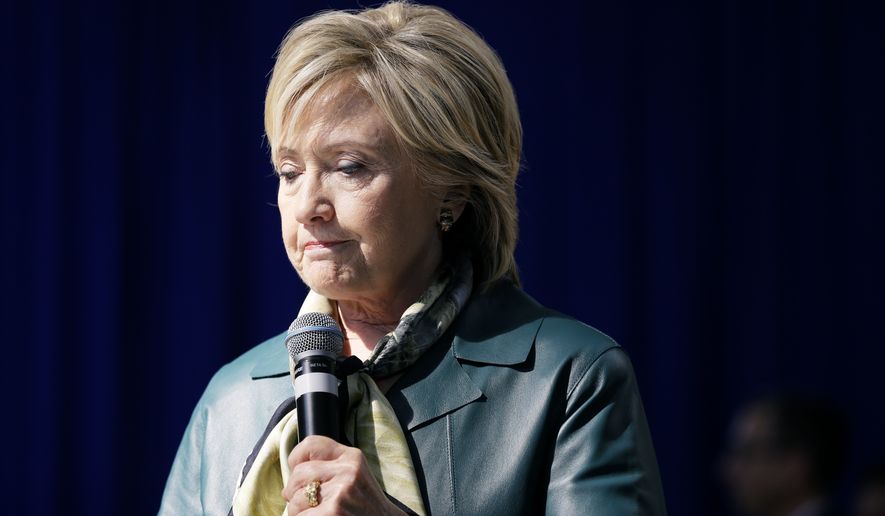The State Department has told former Secretary Hillary Rodham Clinton to go back and search for still more emails, releasing a letter Tuesday urging her to see whether her Internet providers can recover any of the messages believed to be missing from a “gap” during her first months in office.
The move, which administration attorneys revealed in a court filing, was made as the legal case to pry messages loose takes a new turn.
Judicial Watch, a conservative public interest law firm pursuing the emails, told a federal judge Tuesday that it would argue that the email account and the server Mrs. Clinton kept at her home in New York were always government property, so the State Department — not Mrs. Clinton — has an obligation to go through the emails and decide what should be released to the public.
Administration attorneys signaled that they will fight that claim, arguing that Mrs. Clinton’s server was the equivalent of a private account not under government control. Judge Emmet G. Sullivan gave no indication how he was leaning and instead ordered a monthslong process of briefing papers to begin to flesh out the legal arguments.
“When Mrs. Clinton was secretary of state, as head of the agency, the State Department had control,” Judicial Watch attorney Michael Bekesha said.
The email scandal shows little sign of subsiding a year after the State Department first prodded Mrs. Clinton to return some 30,000 messages from her four years as secretary.
SEE ALSO: Hillary Clinton not honest and trustworthy, Florida, Ohio, Pennsylvania voters say
But those emails, which she culled from her server in New York, did not include messages from her first two months in office. Mrs. Clinton said she was using a private account that she kept from her time as a senator. Her aides have said she no longer has access to that account.
Some messages have surfaced, however, in the files of those with whom she was emailing, prompting the State Department to prod Mrs. Clinton to go back and try to reconstruct the files herself.
“As a result, I ask that you confirm that, with regard to her tenure as secretary of state, former Secretary Clinton has provided the department with all federal records in her possession, regardless of their format or the domain on which they were stored or created, that may not otherwise be preserved in the department’s recordkeeping system,” Patrick F. Kennedy, undersecretary of state for management, said in the letter, dated Oct. 2.
“To the extent her emails might be found on any internet service and email providers, we encourage you to contact them,” Mr. Kennedy wrote.
The letter was revealed in a filing with the U.S. District Court for the District of Columbia on Tuesday, just hours before Judge Sullivan heard arguments in two separate cases trying to pry loose emails from Mrs. Clinton and some of her top aides.
Judicial Watch is pushing for Judge Sullivan to grant discovery in the case, which could require the State Department to disclose more details about Mrs. Clinton’s email arrangement. Mr. Bekesha said Judicial Watch is keen to know whether Mrs. Clinton was a “rogue employee” ignoring department advice or whether her arrangement was approved.
Judicial Watch is trying to get a look at some of the 30,000 messages Mrs. Clinton deemed personal and said she deleted, rather than turning them over to the government. Mrs. Clinton and the State Department say the law gives employees the right to make those decisions about private email accounts, but Mr. Bekesha said if Mrs. Clinton’s server is deemed to be a government server, then independent State Department employees should have made those decisions.
Mr. Bekesha said the fact that Mrs. Clinton didn’t have any other email for government business, that she allowed at least one other department employee to keep an account on her server, and that she had a State Department official provide maintenance for the server all suggest that it should be treated as government property.
Government attorneys called that “an incredibly novel legal theory.”
Judge Sullivan delivered a small victory to the Obama administration, saying he would put off decisions about discovery until later in the process — though he said Judicial Watch will have a chance to make that argument.
In the meantime, the State Department will release four more sets of emails, at the end of October, November, December and January.
At least 400 emails released so far contain information that the government now deems classified and that could have been classified at the time she sent or received it.
The FBI is investigating the matter, but Republicans in Congress have called for a special counsel to be named, saying someone with independence from the administration needs to be put in charge.
“This email scandal is more than just bad judgment. It represents a real danger to our nation,” Sen. John Cornyn of Texas, the second-ranking Republican in the Senate, said in a floor speech Tuesday. “I’m sorry to say, but it’s true that Secretary Clinton’s actions may well have violated a number of criminal laws.”
• Stephen Dinan can be reached at sdinan@washingtontimes.com.




Please read our comment policy before commenting.